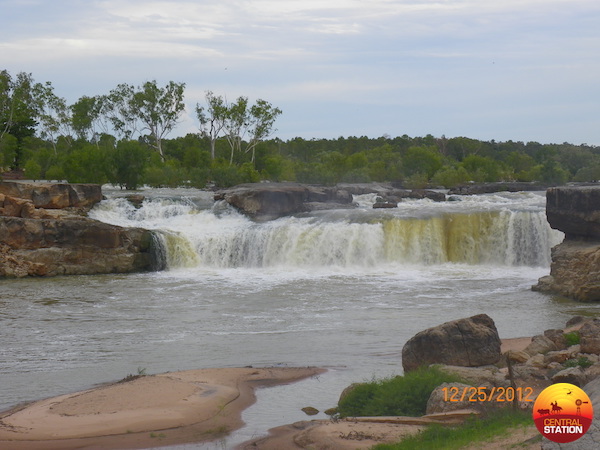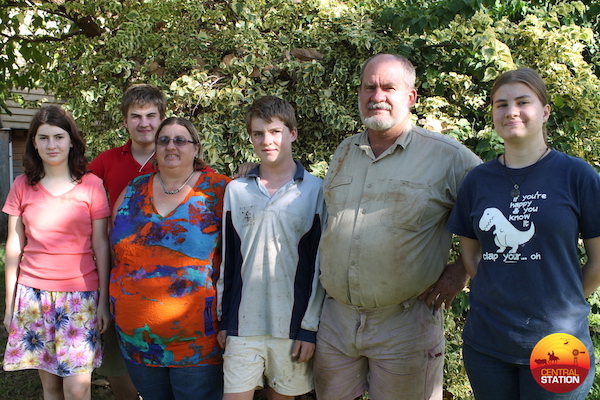“Fifty Years of Family, Floods, and Favour” – Ernie and Kylie Camp – Floraville Station, Qld Gulf.
Host: Kent Saddlery
Written by Helen Kent.
This story excerpt has been contributed by Lyle and Helen Kent of Kent Saddlery from their book “Stories of Australian Country People“.
Mugs of tea have been poured and a plate of freshly-baked Anzac biscuits sits in the middle of the table, begging to be dunked and enjoyed. Overhead, a metal mobile clinks happily in the lunchtime breeze.
It’s Wednesday 4th May 2011 and Kylie Camp returns from collecting the mail, with a knowing look and a chuckle. Holding a cardboard box aloft, she announces, “Here’s those Easter eggs that never turned up!” The chuckle indicates the Camp family’s acceptance of the inconveniences of life in the bush and is a reflection of bush character . . . resilient, robust, and tempered with an ability to laugh; often.
Ernie and Kylie Camp’s particular piece of the bush is Floraville Station, a 94,000 hectare property on the banks of the Leichhardt River, in the Queensland Gulf.
Life at Floraville is directly affected by the river, especially during the wet, when the nearby Leichhardt River crossing can be covered by up to 12 metres of swiftly flowing water. A short distance from the road, the water descends with a roar over the Leichhardt River falls, a drop of another 12 metres. At this seasonal time, it’s a daunting and dangerous place and has been the scene of some tragic accidents. However, it remains a dramatically beautiful spot and a favourite fishing and camping area when the flood waters recede. Locals respect the fact that salt water crocodiles share the waterway and specific signage gives travellers ample warning of possible dangers. Ernie is vigilant. “Sometimes, fixing a floodgate, you get this funny feeling; it’s time to exit, and don’t look back!”
During a big wet, the station’s homestead complex can be inundated by floodwater and other salt water inhabitants sometimes venture downstream. In 1996, following cyclone Larry, Kylie discovered sharks swimming around the Floraville chook yard . . . a news item deemed worthy of statewide ABC coverage.
In the paddocks, the aftermath of ferocious natural disasters such as cyclone Ted in 1976 and record flooding in 1999, is cruel and unexpected. Ernie’s long experience of the aftermath of climate extremes has included the devastating loss of up to half the herd of Floraville cattle. He voices a tough consideration. “Cattle producers often hide their losses following natural disasters, believing that it’s seen as bad management. In such severe weather, it’s beyond the control of any human effort.”
In 1963, circumstances made it possible for Ernie’s parents to move from Calvert Hills. When Ernie’s Mum asked his Dad, “Where would you like to go?” the answer came quickly. “There’s a nice little property on the Leichhardt River I’d like to look at.” A meeting with the retired judge was arranged and when Ernie’s Dad attended, the judge’s nephew was also present. Mr Simpson immediately asked his nephew, “Is this the man?” The answer was affirmative. The former drovers’ integrity had not gone unnoticed and with Mr Simpson’s assistance, the Camps moved to Floraville.
Three aboriginal families came with them and for Ernie’s Dad it was good starting off with experienced stockmen. For Ernie there were always plenty of playmates. He learned about bush tucker and he acquired some indigenous skills. The young lad’s formal education was through School of the Air, on HF (high frequency) radio. Constant static interrupted the radio lessons, but Ernie’s Mum and various governesses maintained a good education for the children through contact with the Primary Correspondence School. Ernie admits, “I didn‘t like the school room much and at times the atmosphere was strained, to say the least.” He remembers the consequences of any misdemeanours. “The twitchy sticks off the saltbush hedge were often put to use.”
Ernie is philosophical about those formative years “There’s nothing to regret along that line: don’t look back, look forward and turn negatives into positives. I admire my kids who are at boarding school today. I couldn’t have done it! I would either have been planning my escape, escaping, or being returned from my escape!”
At 13, the mustering camp represented an opportunity for Ernie to get out of school and the hours spent ‘helping out’ gradually increased until “they couldn’t do without me!”
 Floraville Station – Leichhardt Falls.
Floraville Station – Leichhardt Falls.

